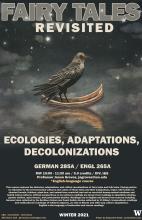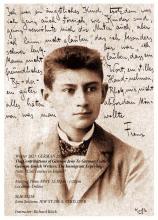Cool Course #1
Fairy Tales, Revisited: Ecologies, Adaptations, Decolonizations
Paying particular attention to the environmental cultures and values of these tales and their adaptations, topics will include enchanted forests; folk-lore, plant-lore, and animal-lore; convivial (and not so convivial) human-animal relations; and hybrid nature-cultures. Critical perspectives on our primary readings are drawn from readings in adaptation studies, gender studies, queer theory, and postcolonial studies. Readings are in English and drawn from sources including German tales collected by the Brothers Grimm and Coast Salish stories collected by Vi Hilbert, transcultural retellings and multicultural recastings of folkloric legacies, as well as Disney and other pop culture adaptations. English is the language of instruction and course readings.
Cool Course #2
The Contributions Of German Jews To German Culture: German-Jewish Writers: The Immigrant Experience
For Jews, living in exile for nearly 1700 years, the opportunities to enjoy the rights of full citizens were never so promising as they were in Germany and Austria during the long 19th century. In the so-called century of emancipation, Jewish Germans took advantage of their newly acquired status as apparent equals to distinguish themselves in all walks of life, particularly in the arts and letters. But alongside such stories of success a new form of Jew hatred was gaining traction that would eventually lead to the destruction of European Jewry under the Nazis. Jewish writing of this period is thus truly remarkable for how it anticipates and responds to the on-going threats immigrants face, including those in America in 2020. These works stand as testimony to the hopes and accomplishments of immigrants as well as to the existential dangers lurking behind the many smiling faces of their fellow citizens. To that end, some of the questions we will pursue are: What does it mean to seek equal status as a citizen when the primary marker of one’s identity, that of being Jewish, is indicative of a dream to return to Zion? How does one demand of the other, the Jew, that they become German when the very notion of “Germanness” is vague, uncertain, and forever changing? We will also be interested in how Jews adopt to modernity. What does Judaism look like now that “God is dead”? Finally, what does the Jewish experience of this time tell us about the migrant and refugee crises of the 21st century.

